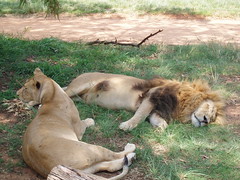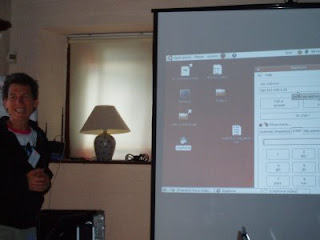 1. Intro:
1. Intro: I finally had time to write up my reflections on the
MobileActive08 conference back in October 2008. The purpose of this conference was to examine how mobile phones and their applications can be used for social impact in developing countries. MobileActive08 was an IDRC-sponsored event with some of the top 360 mobile phone social researchers, NGOs, ICT4D innovators, technologists, etc. from all around the world gathered in Johannesburg, South Africa. One of the joint organizers,
SANGONET (IDRC partners since 1996), who has worked for years on strengthening civil society organizations and their utilization of ICTs in Southern Africa, teamed up with MobileActive.org to make this event possible.
2. Summary: Overall, the conference was well facilitated by Alison Hewlett, or the self-named orchestra conductor. It was unlike any conference I had ever attended mainly made up of interactive (some self-directed) group sessions. I overheard many participants complimenting the concerted effort in making the space collaborative. This conference found the wonderful mix of researchers mingling and challenging the efforts of technology developers (or developers challenging efforts of other developers). I suppose the whole point of these meetings was to see isolated silos on innovation to come together and work in cooperation for a common cause. I think there was some realization in this as I saw people trying to form geographical and thematic groups (ex. Latin America or Johannesburg MobileActive group). I also noticed some NGO representatives were there to see what tools and research were currently available in mobile applications which could be applied to their own work. I think this conference was well designed and reached its set objectives.
3. Web 2.0: MobileActive made a concerted effort to incorporate several Web 2.0 collaborative tools online: Twitter, youtube, blogging, slideshare, Facebook, confabb, etc. It is the conference where keeping your cellphone on is allowed. Their website attempted to collate and aggregate all the tool uses onto their website. Of course, when I was monitoring the usage of the tools, I only really saw the Twitter tool being used in real-time.
The leaders of groups were asked to provide a discussion report and upload on confabb notes, a very useful tool. After testing the tool myself, Confabb is an easy uploading tool for delegates to use for rapporteur or summary notes of conference sessions. However, by the end of the conference, I was only able to see a few conference discussion notes on the confabb note share tool. If this is the participation by innovators, I wonder what result would come from a conference of African partners where they may or may not be Web2.0-savvy. Would participation be better or worse? I think some training will be required prior to conference if one hopes for Web 2.0 usage.
4. Outputs: I observed one major output from the conference: the development of an
open mobile consortium. I also noted that from the Disaster and Mobile conference, the panelists will also try to work together to make their applications interoperable and assist each other’s needs. Another output was a
paper by Jonathan Donner and Katrin Verclas which was presented at a recent Mobile for Development (M4D) conference in Karlstad University, Sweden.
Click links for:
- MobileActive08 Powerpoint Presentations- MobileActive08 Photos- MobileActive08 You-Tube Videos: Find 40 new quality videos produced at the conference

















